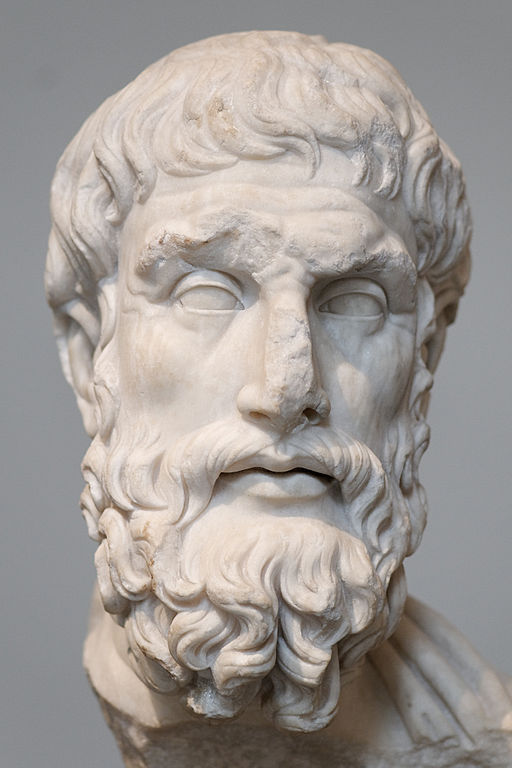Monday, Jan. 15
Required:

Read the following before class (the Epicurus texts are quite short):
1. Epicurus, Letter to Menoeceus (PDF): Epicurus, Letter to Menoeceus
- This is a letter that the ancient Greek philosopher Epicurus wrote to someone named Menoeceus. There are few surviving documents written by Epicurus, so some of what we know of his views come from letters like this one.
2. Epicurus, Principal Doctrines (PDF): Principal Doctrines
- This is a list of short views from Epicurus; Epicureans would memorize brief sayings like this to help them remember the tenets of the philosophy. So they’re lacking in detail, mostly, and are somewhat random! We’ll discuss their meaning in class, but please read them ahead of time.
3. Cicero, selections from Book I of De Finibus (PDF): Selections from Cicero, De Finibus, Book 1 (PDF)
- Cicero was a Roman philosopher who wrote about Epicurean philosophy after Epicurus’ death. This text is a fictional dialogue between people, in which one person is explaining the Epicurean philosophy.
Optional
texts
The Stanford Encyclopedia of Philosophy has a clear discussion of Epicurus’ views on what kinds of pleasures are best (as well as a discussion of the nature of the soul, and fate): http://plato.stanford.edu/entries/epicurus/#4
The Internet Encyclopedia of Philosophy also has a good discussion of Epicurus’ views on pleasure and how to live with the most pleasure: http://www.iep.utm.edu/epicur/#H5
videos
A video on Epicurus’ prescription for a happy life, from Wi-Phi: open access philosophy: https://youtu.be/E5f5smh7Keo
podcasts
The Australian Broadcasting Company has a podcast series called The Philosophers’ Zone, and they have an episode on Epicurus: http://www.abc.net.au/radionational/programs/philosopherszone/the-athenian-philosopher-epicurus/2986170
Here’s another podcast on Epicurus, by Peter Adamson, in the “History of Philosophy Without Gaps” podcast series. This one is called “Am I Bothered? Epicurean Ethics”: http://historyofphilosophy.net/epicurus-ethics
Wednesday, Jan. 17
We will continue discussing Epicurus and Cicero.
Discussion meetings Jan. 17 or 19
There will be student-led discussions in discussion meetings this week (you will be signing up to do one of these during the term).
We will also talk about writing effective introductions, thesis statements, and topic sentences for paragraphs, in preparation for submitting these for peer feedback next Monday.
Monday, Jan. 22

Required:
Assignment due:
Essay 1 intro paragraph and outline due Monday, Jan. 22 by noon. Go to the Canvas site for this course, log in, click on “Assignments” to submit. There is also information on how to do peer feedback on Canvas under “Announcements” on our Canvas site (only visible if you log in).
Note that you must submit your draft by Jan. 23 at 11:59am (it will count as late if it’s after the above due date), because after that peer reviews are assigned and you may not be able to participate in peer review online after that.
Reading for Monday, Jan. 22
Nagel, T. (2012). “Death.” Mortal Questions. Cambridge University Press. This chapter is a response by a 20th century philosopher to the kind of argument about not fearing death that Epicurus puts forward.
- You can access this book chapter through the UBC library course reserves page for this course (need a CWL to log in to see it). The link gets you to a book by Nagel; find in that book the chapter called “Death.”
Wednesday, Jan. 24
Required
Mozi. (2001). Readings in Classical Chinese Philosophy. P.J. Ivanhoe and V.W. Van Norden (Eds). Indianapolis/Cambridge: Hackett. Mozi was an ancient Chinese philosopher, and this text provides a few of his views and arguments for them. His idea of “impartial caring” will come up again when we discuss consequentialism and utilitarianism.
- You can access this short reading by going to the UBC library course reserves page for this course (need a CWL to log in to see it).
Optional
- You could watch a video from a UBC MOOC (Massive, Open, Online Course) on Chinese thought, by Ted Slingerland from Asian Studies at UBC. The video is about 15 minutes long. It also talks about links between Mozi and a philosopher named Peter Singer, whom we’ll discuss later in the course.
- Here is the course that the video comes from. If you click “enroll” (for free) you can see all the materials from the course (you’ll have to register an account with EdX).
- Here is a transcript from the video (Microsoft Word format): Mozi Video Transcript (Slingerland) (Word format)
- The Stanford Encyclopedia of Philosophy has a useful entry on Mozi, and the section on Inclusive Care is most relevant for our course.
Friday, Jan. 26
Assignment due:
Peer feedback on essay 1 drafts is due Friday, Jan. 26, by 5pm. Again, go to the Canvas site for this course, log in, and click on “Assignments.” There is information on how to do peer feedback on Canvas under “Announcements” on our Canvas site (only visible if you log in).